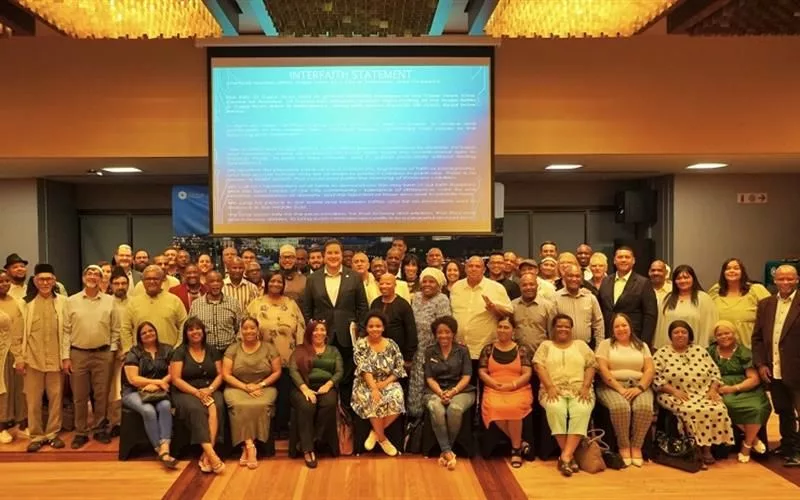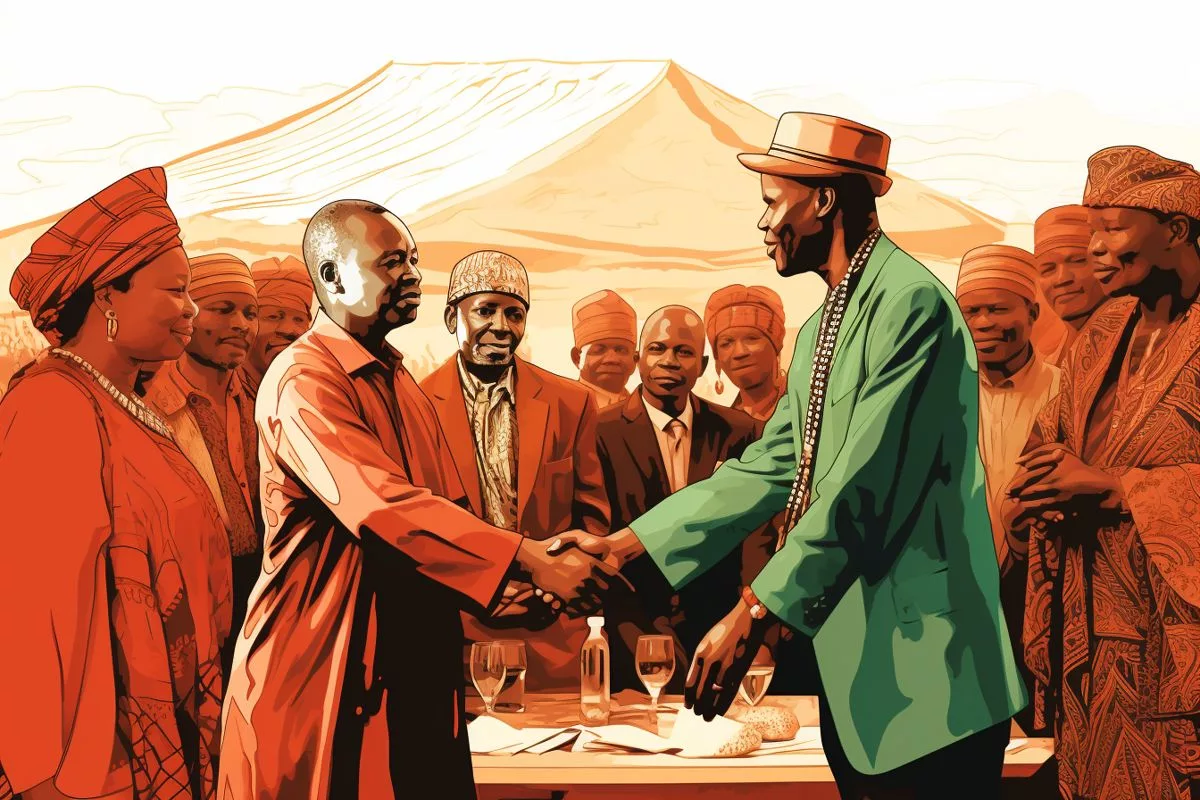Cape Town is more than just a beautiful city – it is also a place that celebrates diversity and inclusivity. The Interfaith Dialogue, attended by religious leaders from various faiths, highlights the city’s dedication to safeguarding residents’ rights to worship freely and live harmoniously. The event serves as a powerful reminder that Cape Town is a beacon of hope and unity, not just for its breathtaking landscapes, but also for its commitment to diversity and tolerance.
What is Cape Town known for besides its natural beauty?
Cape Town is celebrated for its commitment to inclusivity, diversity, and tolerance. The city’s Interfaith Dialogue, attended by religious leaders from all prominent faiths, reaffirms Cape Town’s dedication to safeguarding residents’ rights to worship freely and live harmoniously without threat or coercion. The event serves as a forceful reminder that Cape Town is not just a city with breathtaking landscapes, but also a beacon of hope and unity in diversity.
A Harmonious Tapestry of Diversity
Cape Town, nestled against the majestic Table Mountain and kissed by the Atlantic’s cool winds, is celebrated for its mesmerizing natural aesthetics. However, the charm of this South African city extends beyond its picturesque vistas. It has evolved as a city that champions acceptance and embraces diversity. This commitment to inclusivity was reinforced during the annual Interfaith Dialogue, held at the Cape Town Civic Centre on November 14, 2023.
The gathering was a melting pot of religious leaders from diverse faiths prevalent in the city. These leaders, bound by their shared aspiration for peace and tolerance, put forth a unified statement reflecting Cape Town’s dedication to embracing diversity. This collective voice was not merely a local cry for action, but also a global appeal for tranquility, particularly in regions marred by strife and discord such as the Democratic Republic of Congo, Mali, Sudan, Ukraine, and notably, the Middle East.
The collective proclamation powerfully reaffirmed Cape Town’s identity as a sanctuary of tolerance. It underscored the city’s steadfast dedication to diversity, inclusion, and the constitutionally preserved right of each resident to freely follow their faith. Highlighting the intrinsic worth of every individual, regardless of faith or origin, the declaration also emphasized the universal responsibility to safeguard children, the purest and most defenseless amongst us.
Dialogue: Embracing Differences, Fostering Growth
The leaders’ manifesto celebrated the essence of democratic discourse: recognizing and celebrating the myriad hues of existence and beliefs, nurturing a dialogue that is empathetic and accepting of dissimilarities. It acknowledged that diverging perspectives often breed unease, but it is this very unease that should be seen as an avenue for introspection and interaction with those who differ from us.
This proclamation also paved the way for action, inspiring the residents of Cape Town, irrespective of their faith, to embody the finest aspects of their spiritual traditions and the core principles of their community. It motivated citizens to perceive discomfort as a catalyst for tolerance, empathy, and celebration of diversity, while simultaneously rejecting the purveyors of hatred.
Prayers for Peace: A Resounding Echo of Unity
In the face of global turbulence, the leaders’ appeals for peace and serenity were both profound and touching. They prayed for an end to unrest, especially the protracted conflict in the Middle East, and for those brave souls who relentlessly endeavor to mend rifts and secure a peaceful, just resolution to historical disagreements.
These prayers and pronouncements, echoing from Cape Town’s heart, reverberated well beyond the city’s boundaries. They acted as a stirring reminder of the city’s allegiance to tolerance and diversity – a vibrant testament to Cape Town’s spirit of acceptance and unity amidst diversity.
A City Upholding the Sanctity of Diversity
The Interfaith Dialogue, graced by religious leaders from all prominent faiths and the city’s Mayor, Geordin Hill-Lewis, served as a forceful reminder that Cape Town is not merely a city with breathtaking landscapes. It is a city that nurtures and celebrates diversity. The event was a compelling demonstration of the city’s commitment to safeguard its residents’ rights to worship freely, voice their opinions openly, and live harmoniously without threat or coercion.
In a world punctuated by discord and conflict, Cape Town emerges as a beacon of hope and tolerance, a testament to the potency of unity in diversity. The city’s Interfaith Dialogue is a validation of this commitment, a call for peace and harmony that echoes beyond its geographical limits and inspires a global audience. As Cape Town continues to endorse diversity and inclusion, one cannot help but admire the spirit of unity that defines the city of Cape Town.
1. What is Cape Town known for besides its natural beauty?
Cape Town is known for its commitment to inclusivity, diversity, and tolerance, particularly through its annual Interfaith Dialogue event attended by religious leaders from various faiths.
2. What is the Interfaith Dialogue in Cape Town?
The Interfaith Dialogue in Cape Town is an annual event attended by religious leaders from diverse faiths that serves to reaffirm the city’s dedication to safeguarding residents’ rights to worship freely and live harmoniously without threat or coercion. It is a demonstration of Cape Town’s commitment to diversity and inclusivity.
3. What does the Interfaith Dialogue in Cape Town highlight?
The Interfaith Dialogue in Cape Town highlights the city’s dedication to safeguarding residents’ rights to worship freely and live harmoniously without threat or coercion. It serves as a powerful reminder that Cape Town is a beacon of hope and unity in diversity.
4. What is the significance of the leaders’ manifesto in the Interfaith Dialogue?
The leaders’ manifesto in the Interfaith Dialogue celebrates the essence of democratic discourse by recognizing and celebrating the myriad hues of existence and beliefs, nurturing a dialogue that is empathetic and accepting of dissimilarities. It inspires citizens to embody the finest aspects of their spiritual traditions and the core principles of their community, while simultaneously rejecting the purveyors of hatred.
5. What is the impact of the Interfaith Dialogue beyond Cape Town’s boundaries?
The Interfaith Dialogue’s prayers and pronouncements, echoing from Cape Town’s heart, reverberated well beyond the city’s boundaries. They acted as a stirring reminder of the city’s allegiance to tolerance and diversity – a vibrant testament to Cape Town’s spirit of acceptance and unity amidst diversity, inspiring a global audience.
6. What does Cape Town’s commitment to diversity and inclusion demonstrate?
Cape Town’s commitment to diversity and inclusion demonstrates the city’s dedication to safeguarding residents’ rights to worship freely, voice their opinions openly, and live harmoniously without threat or coercion. It serves as a forceful reminder that Cape Town is not just a city with breathtaking landscapes, but also a beacon of hope and unity in diversity, endorsing diversity and inclusion.








